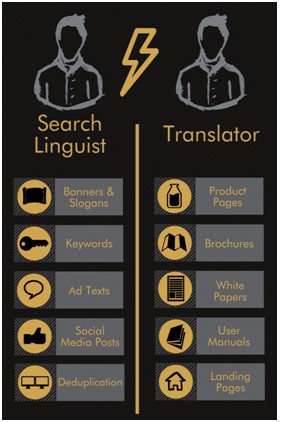Search linguists and translators have different sets of skills, and successful SEO-localisation projects require both. Let’s take a closer look at their areas of expertise and responsibilities.
Search linguists
As the image above shows, search linguists tend to work on banners and slogans, keywords, ad texts, and social media posts. A native search linguist will be an invaluable addition to your team when it comes to any SEO-localisation project: they will be able to combine culture, language, and the local search engine of choice to produce high-quality keyword research. Simply translating your keywords from one market to the other may have costly consequences, precisely because it doesn’t take into account the three parameters mentioned above nor the individual search habits.
It’s vital for the search linguist to be a native speaker of the language as this is necessary to find all the opportunities available to you when it comes to organic search terms. Direct translations are rarely accurate, and regional variations add to the language complexities. Only native linguists can successfully tackle these issues. Additionally, search linguists identify the relevant primary and secondary keywords to use on each page of the website, as well as create highly relevant meta content for each of the optimised pages. They are aware of the character restrictions in place and take these into account when creating the meta content.
Translators
Translators, instead, work on product pages, brochures, white papers, user manuals, and landing pages. They ensure that your localised content is as good as your source content as well as consistent, and they also create glossaries of key terms and stylistic guidelines to make sure that the content is in line with your company’s brand and message.
Translators will often also localise as they translate, so as to take cultural considerations into account, as well as adopt a more creative approach when required – as in the case of marketing content, for instance. Additionally, they make use of Computer Assisted Translation tools to speed up the translation process and cut the costs whilst preserving the quality of their work.
When it comes to SEO-localisation projects, translators have to keep up with the ever-evolving international digital marketing practices, especially those related to SEO. Part of their responsibility is to incorporate the keywords in the translated text, a demanding job which requires great command of the language to make sure that the optimised text sounds natural. Finally, translators perform a number of quality checks before delivering their work.
In order for an SEO-localisation project to be a success, you need a team including both translators and search linguists. To find out more about their contribution when it comes to SEO-localisation, check out our e-book.











One Response
Yeah it is huge difference. You need a translator that have a common sense of the whole SEO and SEM world